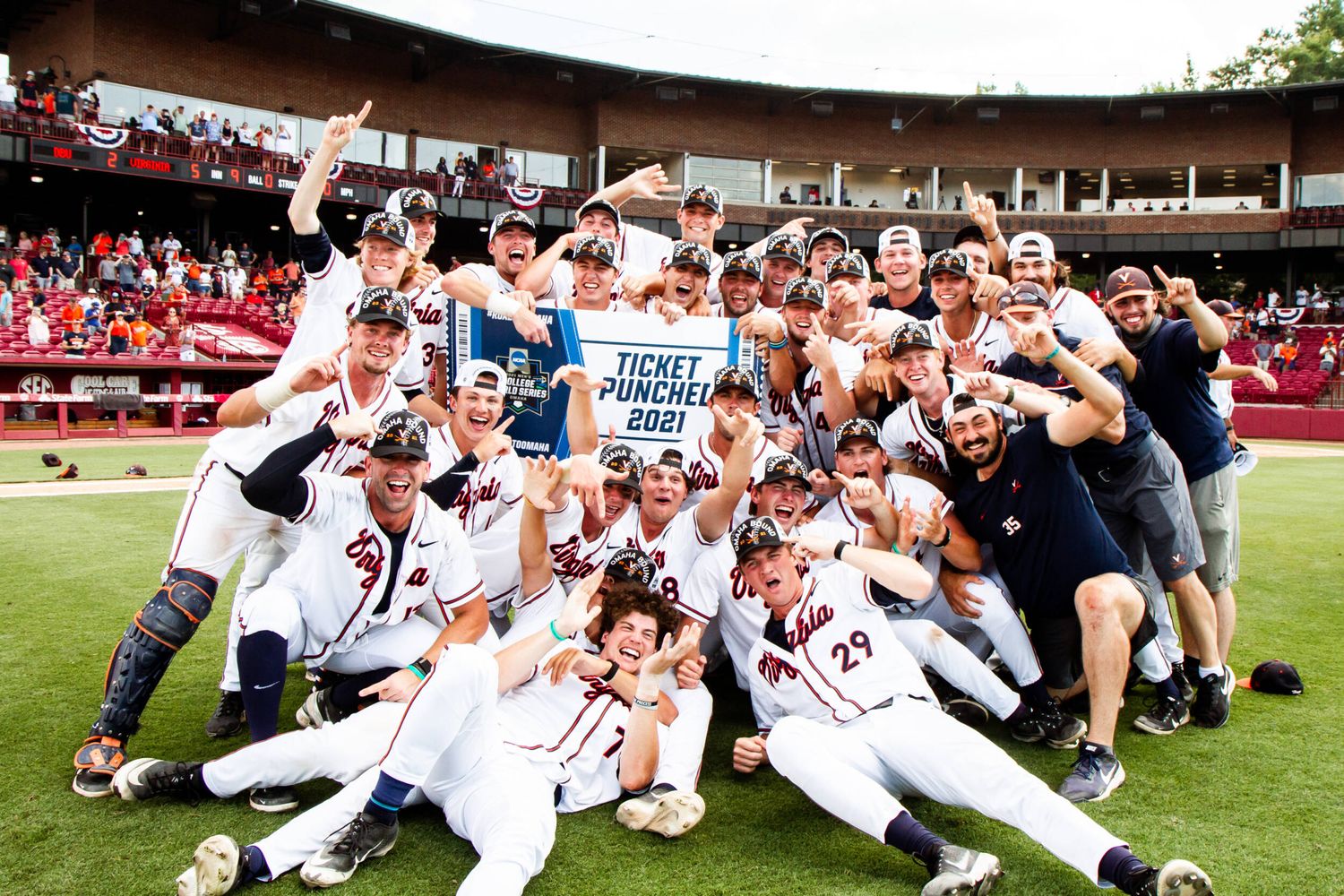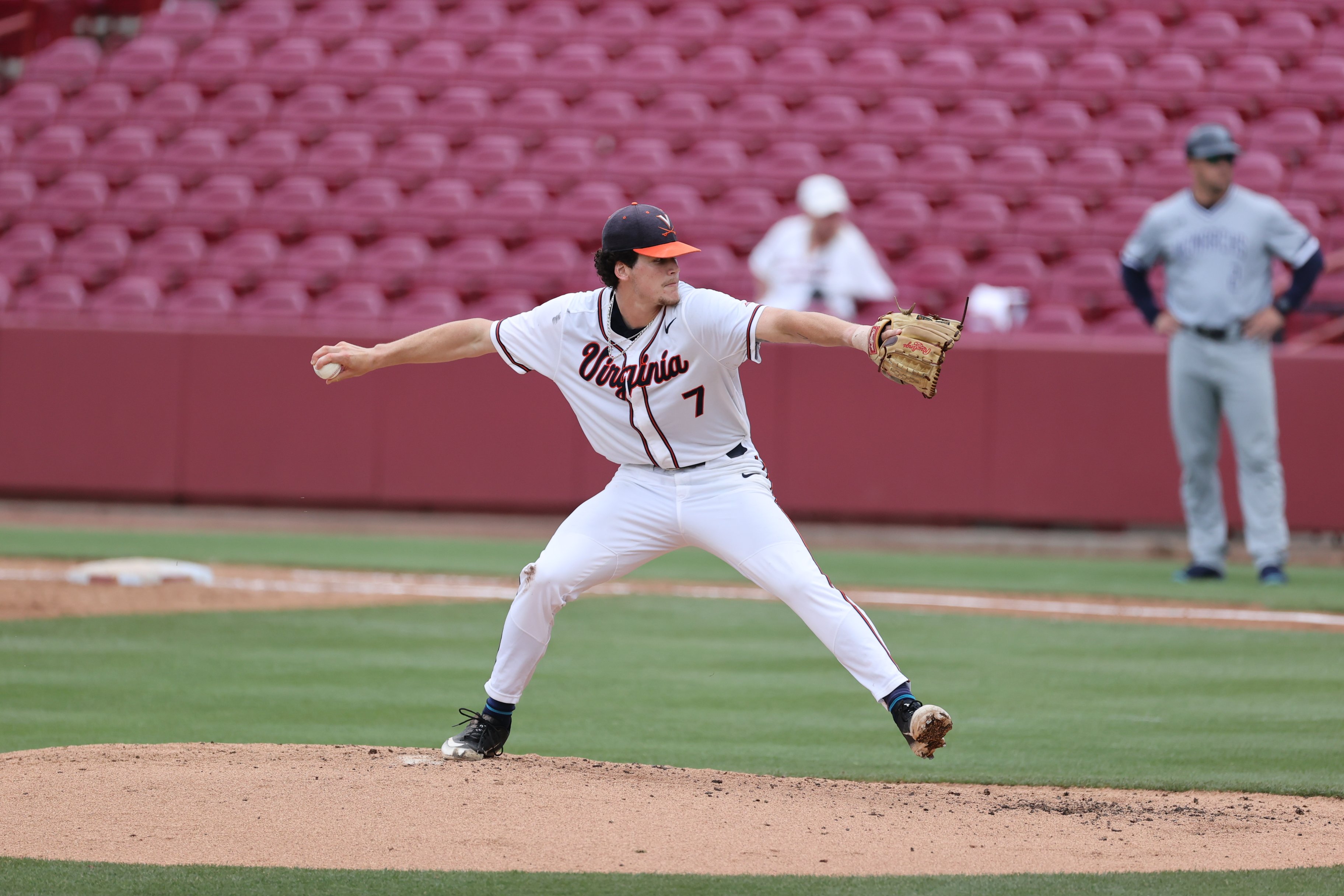
Auto racing had “The Intimidator” in Dale Earnhardt. Hollywood has its “Terminator” in Arnold Schwarzenegger. College baseball has the “Eliminators” in Virginia baseball.
For nearly two weeks, the Hoos were between the hammer and the anvil after losing their opening game of the Columbia Regional to host South Carolina and, later, the first game of the Columbia Super Regional to Dallas Baptist. After each loss, a next defeat would have been their last and would have eliminated them from College World Series contention.
Instead, the Cavaliers refused to yield, winning four consecutive games to reach the Super Regionals and two in a row to advance to Omaha.
Only two other teams before Virginia, Rice in 1999 and Florida State in 2008, lost the opening game of their respective Regionals and their Super Regional openers and then advanced in this tournament format. What makes Virginia unique among this trio? One significant difference. The Cavaliers played every elimination game away from home. Rice played its Super Regional games in Houston and Florida State played both the Regional and Super Regional in the friendly confines of Mike Martin Field in Tallahassee.
In a 2016 ESPN article, Senior Writer Jayson Stark put it this way about the San Francisco Giants. “Ten times in their past three October appearances, the Giants have headed for six different ballparks in three different time zones, knowing a loss would end their season. So what are the odds of winning, say, seven of those games? Or eight? Or nine? Well, I’ll tell you one thing. They might be greater than the odds of Pablo Sandoval winning the Olympic 100-meter final.” That’s not relevant, but it’s funny.
What allows a team to stave off elimination in multiple must-win games? Or at least, what allowed the Cavaliers to pull it off?
By now, anyone that follows UVA athletics or Virginia baseball knows the story.
Following a Friday night loss in game one of Virginia’s conference series at Georgia Tech, the Hoos were 4-12 in the Atlantic Coast Conference and 11-14 overall. Since that evening in downtown Atlanta, Brian O’Connor’s team has gone 24-11 (.685) overall, 14-6 (.700) to finish out the ACC regular season, and 8-3 (.727) in the postseason. As you take a deeper dive into the UVA 2021 baseball season, you see three key factors that led to the turnaround.
Attitude and Perspective
During his time with the media on Wednesday, O’Connor said “This is our fifth trip [to the College World Series], and I’ve got to tell you, they’re all joyous. They’re all wonderful. They’re all unique in their own way. But this one, I tell you, the route that this team has taken speaks to the character and the resiliency and the type of young men we have in this program.”
Two of my favorite quotes are “I’d rather attempt to do something great and fail than to attempt to do nothing and succeed” and “Tough Times Never Last, but Tough People Do.” These words truly capture the attitude and perspective of the Cavalier squad over the last eight weeks.
As O’Connor reflected on the Super Regional win in Columbia, he made the point that Virginia’s success over the last two months “speaks to the decision [the team] made to stand up two months ago and run to [the problem] rather than run away from it. When things get tough, you have a choice. A lot of people choose to hide or run away from it. I challenged them to make a decision and I said I hoped they were the type of team to run to the problem. They made the decision individually and collectively to stand up and take it on.”
Tough times never last, but tough people do.
Sophomore Chris Newell and junior Nic Kent both were aware of the challenge the 4-12 club was facing just getting into the ACC Tournament and what it would take in terms of each individual’s determination and contributions to make it to the postseason.
“We knew what lied ahead of us,” Newell admitted. “We knew we had to win out basically [every] series or if not then sweep a series, which we did. We all had a feeling we could do it. I don’t think we ever lost that. Honestly, I think that’s special about this group.”
Kent added that the team began focusing on themselves and what they could do to get back on track and stopped focusing on other noise: “Not worrying about the expectations that everyone had for this team. Going to Omaha, preseason rankings, and all of that went down the drain.”
“We put the blinders on,” Newell added. “[We] took it day by day, game by game, and here we are now. That says a lot about this group.”
“We said focus on one game at a time, play loose, and give it everything you have. Then it got going,” Kent concluded.
I’d rather attempt to do something great and fail than to attempt to do nothing and succeed.
Most great people fail in life. Many fail more than they succeed. Albert Einstein, Bill Gates, Colonel Harland Sanders (1,009 restaurant rejected his franchise business model before one accepted), Jim Carrey, Katy Perry, Stephen King (Carrie was rejected by 30 publishers), Thomas Edison, Walt Disney (his first company went bankrupt), and countless others. Writer J.K. Rowling, who was living on welfare trying to support her daughter and saw Harry Potter and The Sorcerer’s Stone rejected by all 12 major publishing houses, said “It is impossible to live without failing at something, unless you live so cautiously that you might as well not have lived at all, in which case you have failed by default.”
After the opening game loss to Dallas Baptist in the Super Regional, O’Connor said the staff talked to the team and reminded them that “… they need to come ready to play tomorrow; that it’s just one game. Our program has been in this position before and it doesn’t matter who wins the first game. It’s a series and it’s a matter of who wins this series. That they stay in the moment and continue to fight and if we don’t do it, they can live with themselves because they laid it all on the line.”
Perspective.
Since his arrival in Charlottesville, O’Connor has preached not carrying the bag of bricks from the previous game into the next. Not carrying the trials of last month or last season into the next. That if you work hard and handle your business the correct way, the game will reward you.
O’Connor said the Cavaliers don’t really approach elimination games any different than most. Obviously, if you’re in a lose-or-go-home game and your pitcher is handing out free passes like candy on Halloween, there’s a different sense of urgency to make a change. But heading into Omaha, O’Connor maintains his game-by-game perspective.
“The nice thing about [game] spacing [in the College World Series], you have time to digest it and move on to prepare,” O’Connor said. “The thing about baseball is that you lose a lot in the game, but you get right back out there. I hope that doesn’t happen in Omaha. I don’t enjoy being in that situation. I told our guys, ‘Can we score some runs earlier in the game?’ They keep putting me through this torture.”
A smiling O’Connor added that “if we do fall into that situation, we’ll have a plan.”
Like the well know overcomers listed above, the Hoos are resilient, a word frequently used to describe the 2021 team. It’s a word O’Connor calls a great quality to have.
“It’s a great word to describe this team right now,” he said. “What a great lesson to learn in preparation for life. They need to be resilient and able to bounce back. It speaks to their character.”
That resilience was instilled long before the 2021 season began. It’s part of the culture of Virginia baseball. The teaching starts day one and continues even after many players depart for the next season of their lives.
Zack Gelof may have said it best in a preseason video called ‘What it Means to be a Cavalier Baseball Player.’ He said in UVA Today: “Your best is different than the best. The best is all about comparison. Your best is based on you and what you can do as a person, mentally and physically, and if we have everyone’s best within this group of guys, we are going to be the best.”

Great Pitching and Defense
Many have heard the adages ‘defense wins championships’ or ‘defense plays every day’ and these things are true. Nine of D1Baseball.com’s top 10 plays of the eight Super Regionals were defensive plays, three by UVA defenders.
You may have also heard that pitching wins championships and I believe that is true. Virginia faced the second and third leading home run teams in college baseball in No. 2 Old Dominion (105) and No. 3 Dallas Baptist (101). Ironically, Virginia went 4-1 against those two clubs while allowing only one home run but won the regional with a walk-off homer to end ODU’s season and a grand slam to close the door on DBU’s Omaha dream. Baseball is a funny game.
Pitching has been at a premium for Virginia in the eight NCAA Tournament games under pitching coach Drew Dickinson. Take a look at some of the numbers:
- K%: 32.6% (97-267)
- K% Looking: 25% (24-97)
- Hitting %: .218 (57-261)
- Hitting% w/RISP: .211
A lot of the credit for Virginia’s success on the mound was the postseason rise of Devin Ortiz, Griff McGarry, Matt Wyatt, and Brandon Neeck. O’Connor made a point to credit former pitching coach Karl Kuhn for bringing those guys to Charlottesville. He also praised the efforts of current pitching coach Dickinson for the development and success of the entire staff.
“He’s very thoughtful,” noted O’Connor about Dickinson. “He has conviction about who he thinks can get us off to a good start. He believes in all off his guys and he’s been right on with his conversations about what the right thing to do is. A lot is made of who starts the game, but matchups are important also. It’s not necessarily who starts the game, although that will be important. [You’re] going to need a number of guys [in any elimination game].”
Virginia’s defense has been at a premium as well in the NCAA postseason games. The Hoos fielded at a .974 clip in Columbia and pretty much created their own Top 10 defensive play reel.
“At championship time, you’ve got to be opportunistic offensively, you have to be elite on the mound but tied to that, you have to be really good defensively,” O’Connor said. “You need the play Chris Newell made. You need the play Nic Kent made to his glove side up the middle and threw the guy out. If you don’t make those plays, it flips and maybe you don’t win the game. You’ve got to make routine plays, but you have to [make] spectacular plays sometimes too. Every team is too good. But defense, you can’t win without it.”
The defense came to play in each game of this tournament so far. The Wahoos held the No.6 and No. 11 scoring teams in the nation, Old Dominion (7.85 RPG) and Dallas Baptist (7.64 RPG), to 3 and 4 runs per game respectively. UVA’s pitching staff will arrive in Omaha having given up an average of only 3.5 runs per game in the postseason.
Seizing the moment
In any championship, there always seems to be that player or group that always seems to step up their game. That was constantly evident in the Columbia games for Virginia. O’Connor said guys will need to continue to step up in Omaha.
”All 8 teams going to Omaha can win this thing,” he said. “It’s wide open. It’s the team that is consistent and has a couple of guys rise up in key moments and has a couple of things go their way.”
That’s exactly what happened in South Carolina. Virginia entered regional play with only two hitters hitting .300 or above. In the regional round, Teel (.391), Logan Michaels (.353), Zack Gelof (.348), and Ortiz (.333) all were well above .300. Max Cotier just missed it by .006.

The starting pitchers for the final three games of the regional combined for six starts in 2021, including the first career start for Devin Ortiz in the regional championship game. The three pitchers – Griff McGarry, Matt Wyatt and Ortiz – combined for 12.1 innings, three runs allowed, and 22 strikeouts. Talk about some stepping up. Before regional play, Ortiz had pitched just two innings all season. Neeck, a mere 16.2. Wyatt came into the regional with a 5.40 ERA and McGarry was sporting a 7.46 number. Wyatt simply pitched 10.2 frames of shutout baseball against USC in game five of the regional round and closed out the final five frames of the Super Regional clincher vs. DBU. Overall, he surrendered just four hits while striking out 16. I didn’t need the calculator to figure out his ERA.
McGarry got the start against ODU in the first matchup of the regional. After losing the Super Regional opener, the Hoos went back to McGarry to get the series even in game two. How did he respond? A solid first game cut short by a bleeding blister and seven innings of shutout baseball against the Patriots. McGarry allowed only four hits and three earned runs, sitting down 18 hitters via the strikeout. His ERA: a stellar 2.67.
Neeck’s “step-up” moment came in setting the program’s single-game postseason record with 16 strikeouts and earning his first win of the season in the first ODU contest. Neeck also posted a zero ERA in his 6.2 innings of NCAA play, giving up three hits and fanning 17. Of course, Stephen Schoch delivered with an extended appearance too. And Ortiz had his dual hero moments in the regional title game against ODU, going four scoreless on the bump while allowing a hit and fanning six and also smashing the walk-off, regional-clinching home run.
“It’s tournaments like these, it’s postseason time where players emerge and step forward to help their team accomplish something great,” O’Connor said in his postgame comments.
Finally, a tip of the cap to those defenders and hitters who produced seizing the moment plays.
Chris Newell’s home run robbing catch in the Super Regional final. Nic Kent’s multiple electric defensive plays at shortstop. The Gelof brothers making Kenny Towns like stops at the hot corner and little brother Jake digging them out at first like Freddie Freeman. Catcher Logan Michaels’ acrobatic foul ball catch while careening over the dugout wall.
Jake Gelof’s 2-RBI homer that put the Hoos in the lead for good against Jacksonville. Ortiz’s 3-RBI, bases-clearing double in game one against Dallas Baptist gave the Hoos at 5-2 lead that unfortunately didn’t hold. Zack Gelof’s go-ahead, leadoff blast in the top of the eighth in game two of the Super Regional and Alex Tappen’s three-run jolt to put the game out of reach.
And of course, Teel’s Super Regional grand slam to clinch game three. O’Connor described a quality that likely helped Teel in that moment.
“Kyle Teel is fearless,” O’Connor said, “and to win games at this elite level of baseball, you not only have to have skill, you can’t be afraid. You will crumble at times when the pressure’s on if you’re afraid. He’s not afraid. He’s got 100 percent belief in his ability.”
From my perspective, this whole team appears to have 100% belief.
So, what does it take to win an elimination game after elimination game in college baseball? It takes elite level defense and consistent pitching. It takes a dominant, shut-down bullpen. It takes the right perspective on the game itself and on life. It takes having the right attitude and perspective about being a part of team. It’s being fearless. It’s not letting the trials of the day become the disappointment of tomorrow. It’s being tough and running to the problem like UVA did in April.
It’s belief.
Winning elimination games and winning in life is not about single game planning or changing your process. It’s development and growth in attitude, knowing when you need to do something extra, and taking care of the critical elements in your world like spouses and families, pitching, hitting, and defense. That’s the secret.
“I’ve told them many times throughout their careers that when their baseball career is over, there are going to be times they’re going to have really difficult times in their life,” O’Connor said. “It might be with their marriage, it might be with one of their children, many of them are going to lose their job and their kids and their wife are going to look at them and ask them to step up. That’s one of the great things that baseball teaches and prepares them for, to be great contributors to society and be a positive influence.”



